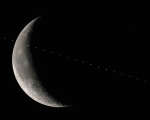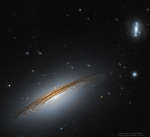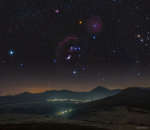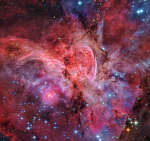
|
Astronomy Picture Of the Day (APOD)
 Trifecta at Twilight
Trifecta at Twilight
19.02.2020
On February 18, as civil twilight began in northern New Mexico skies, the International Space Station, a waning crescent Moon, and planet Mars for a moment shared this well-planned single field of view. From...
 UGC 12591: The Fastest Rotating Galaxy Known
UGC 12591: The Fastest Rotating Galaxy Known
18.02.2020
Why does this galaxy spin so fast? To start, even identifying which type of galaxy UGC 12591 is difficult -- featured on the lower left, it has dark dust lanes like a spiral galaxy but a large diffuse bulge of stars like a lenticular.
 Orion over the Central Bohemian Highlands
Orion over the Central Bohemian Highlands
17.02.2020
Do you recognize this constellation? Setting past the Central Bohemian Highlands in the Czech Republic is Orion, one of the most identifiable star groupings on the sky and an icon familiar to humanity for over 30,000 years.
 The Changing Surface of Fading Betelgeuse
The Changing Surface of Fading Betelgeuse
16.02.2020
Besides fading, is Betelgeuse changing its appearance? Yes. The famous red supergiant star in the familiar constellation of Orion is so large that telescopes on Earth can actually resolve its surface -- although just barely.
 NGC 2392: Double Shelled Planetary Nebula
NGC 2392: Double Shelled Planetary Nebula
15.02.2020
To some, this huge nebula resembles a person's head surrounded by a parka hood. In 1787, astronomer William Herschel discovered this unusual planetary nebula: NGC 2392. More recently, the Hubble Space Telescope imaged the nebula in visible light, while the nebula was also imaged in X-rays by the Chandra X-ray Observatory.
 Carina Nebula Close Up
Carina Nebula Close Up
14.02.2020
A jewel of the southern sky, the Great Carina Nebula, also known as NGC 3372, spans over 300 light-years, one of our galaxy's largest star forming regions. Like the smaller, more northerly Great...
 The Pale Blue Dot
The Pale Blue Dot
13.02.2020
On Valentine's Day in 1990, cruising four billion miles from the Sun, the Voyager 1 spacecraft looked back one last time to make the first ever Solar System family portrait. The portrait consists...
 Spitzer s Trifid
Spitzer s Trifid
12.02.2020
The Trifid Nebula, also known as Messier 20, is easy to find with a small telescope. About 30 light-years across and 5,500 light-years distant it's a popular stop for cosmic tourists in the nebula rich constellation Sagittarius.
 Star Trails of the North and South
Star Trails of the North and South
11.02.2020
What divides the north from the south? It all has to do with the spin of the Earth. On Earth's surface, the equator is the dividing line, but on Earth's sky, the dividing line is the Celestial Equator -- the equator's projection onto the sky.
 Launch of the Solar Orbiter
Launch of the Solar Orbiter
10.02.2020
How does weather on the Sun affect humanity? To help find out, the European Space Agency (ESA) and NASA have just launched the Solar Orbiter. This Sun-circling robotic spaceship will monitor...
|
January February March April May June July August September October November December |
|||||||||||||||||||||||||||||||||||||||||||||||||